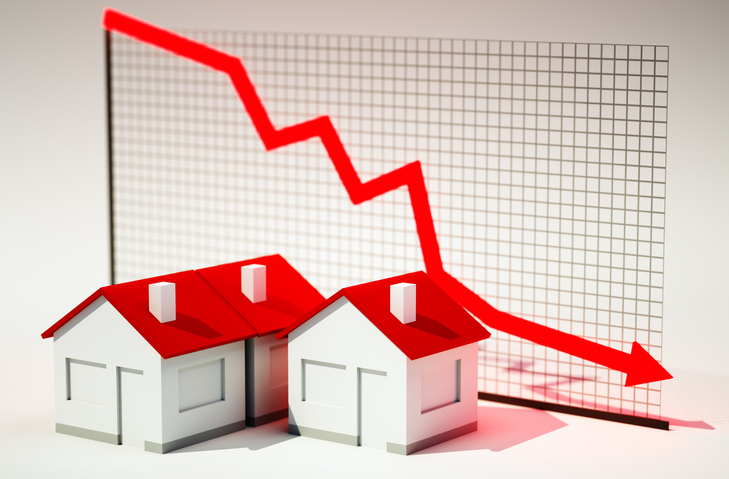In recent weeks, the real estate market in Atlanta has shown signs of shifting, with a sharp decline in mortgage demand catching the attention of both buyers and sellers alike. Recent news about the mortgage and housing markets highlights this trend, as reports indicate that Atlanta mortgage demand has dropped by approximately 10% in just one week, reflecting broader trends across the nation. For homeowners considering selling their property, this development raises important questions: what does falling mortgage demand mean for your selling prospects, and how can you navigate this changing environment effectively?
In this article, we’ll explore the latest news on why Atlanta mortgage demand is falling, how this impacts homebuyers and, more importantly, what it means for sellers who are preparing to list their homes in Atlanta’s competitive housing market.
Why Is Atlanta Mortgage Demand Dropping?
Several factors contribute to the recent decline in Atlanta mortgage demand. First and foremost, rising interest rate levels are playing a significant role. As borrowing becomes more expensive due to higher interest rates, fewer buyers are eager or financially able to secure home loans. Economic uncertainty, inflation concerns, and stricter lending criteria are further discouraging potential buyers from entering the market. For many would-be homeowners, these conditions create hesitation, leading to postponed purchase decisions.
In Atlanta, where the housing market has traditionally been robust, the slowdown in mortgage applications signals a market recalibration. Buyers are reassessing their budgets as monthly payment amounts increase with higher interest rates, making overall payment affordability more challenging. This cautious approach directly affects demand, as fewer buyers—especially those whose income is stretched by rising costs—are getting pre-approved for home loans, contributing to the 10% decline in weekly mortgage demand.
Compared to a year ago, current mortgage demand and affordability have both declined, reflecting the impact of higher interest rates and increased monthly payments on buyers’ ability to purchase homes.
What Falling Mortgage Demand Means for Atlanta Homebuyers
For prospective buyers in Atlanta, the drop in mortgage demand indicates a shift toward a more buyer-friendly market in certain neighborhoods. Homes that once attracted multiple offers within days of listing may now stay on the market longer, giving buyers more negotiation power. Although rising interest rates make financing more expensive, the slower market pace may lead to adjustments in home prices or incentives from sellers eager to close deals.
Buyers may also benefit from reduced competition, allowing them more time to conduct inspections and negotiate repairs or concessions. However, the higher cost of borrowing could offset these advantages, particularly for first-time buyers navigating affordability challenges in Atlanta’s housing market. The current 30 year fixed rate and other fixed rate mortgage options directly impact how much buyers have to pay each month, making affordability a key concern.
The Bigger Concern for Atlanta Home Sellers
For homeowners planning to sell, declining Atlanta mortgage demand is a signal that strategic pricing and marketing are now more critical than ever. With fewer buyers actively seeking financing, competition among sellers increases. This creates a scenario where overpriced homes may linger unsold while reasonably priced, well-presented properties still attract attention. Strategic pricing and effective marketing can have a positive impact on selling outcomes, helping sellers stand out in a competitive market.
Sellers should understand that the buyer pool in Atlanta has narrowed. Fewer pre-approved buyers mean every showing, inquiry, and offer holds more weight in today’s market. Working closely with an experienced real estate agent and local lenders becomes essential for understanding local market dynamics, setting competitive asking prices, and positioning properties effectively to attract the right buyers. In addition to these strategies, other factors such as property condition, neighborhood amenities, and timing can also influence a successful sale.
Pricing Strategies in a Softening Market
One of the biggest mistakes sellers can make in a declining demand environment is overpricing their homes. When Atlanta mortgage demand drops, buyers become more selective and cautious. Listings priced above market value are likely to be overlooked in favor of comparable, more reasonably priced homes.
Sellers should approach pricing strategically, basing their asking price on recent comparable sales, current market trends, and expert advice from local professionals. It’s also important to consider how local home prices and affordability compare to the national average, as buyers may be aware of these broader benchmarks when evaluating value. In some cases, offering closing cost assistance, home warranties, or flexible move-in dates can provide added appeal to buyers facing higher borrowing costs and uncertainties about refinance option .
The Role of Interest Rates in Atlanta Mortgage Demand
Mortgage rates rose recently, contributing to the current decline in Atlanta mortgage demand. Interest rates are at the heart of this trend. As the mortgage rate and higher rates climb, monthly payments on new mortgages rise significantly, stretching the budgets of potential buyers. Additionally, buyers can pay points upfront to lower their mortgage rate, but this increases the initial cost of the mortgage. The bond market also plays a crucial role in influencing mortgage rates in Atlanta, as changes in long-term Treasury yields can directly impact borrowing costs. According to recent reports, even a small increase in rates can lead to a noticeable reduction in purchasing power. For sellers, this translates into fewer buyers being able to afford their home, particularly in mid-range and higher price brackets.
Understanding the impact of interest rates is key for sellers. When rates rise, buyers who previously qualified for larger loans may now find themselves limited to smaller homes or forced to delay their purchase altogether. The effect of rate lock also comes into play, as homeowners with existing low-rate mortgages are less likely to move or refinance, further reducing market activity. This changing financial landscape, influenced by the economy, means sellers need to be realistic about their target buyer and ensure their listing speaks directly to current market conditions.
Mortgage Applications and Data: What the Numbers Reveal
Understanding the ebb and flow of mortgage applications is crucial for anyone keeping an eye on Atlanta’s housing market. Each week, the Mortgage Bankers Association (MBA) releases comprehensive data, which includes insights from the mortgage bankers association, that covers more than half of all U.S. residential mortgage loan applications. This data serves as a real-time barometer for consumer demand, reflecting how shifts in mortgage rates and interest rates directly impact both homebuyers and the broader market.
When mortgage rates rise, as they have recently, the immediate effect is a drop in both purchase and refinance applications. Higher interest rates mean higher monthly payments, which can push some buyers out of the market and reduce the incentive for homeowners to refinance. Conversely, when rates dip, there’s often a surge in refinance activity as consumers look to secure a lower rate and reduce their monthly costs. The MBA’s data also tracks the average loan size, which can signal whether buyers are stretching for larger homes or scaling back due to affordability concerns.
Beyond residential mortgages, the MBA’s reports include insights into government loans and commercial real estate trends, offering a broader view of the market’s health. For example, a rise in government-backed loan applications may indicate that more buyers are seeking affordable options or first-time homebuyer programs. By analyzing these trends, both industry professionals and homebuyers can make more informed decisions about when to enter the market, what type of mortgage to pursue, and how to respond to changing rates and demand.
How Home Sellers Can Adapt to the Current Market
Selling a home when Atlanta mortgage demand is falling requires adaptability and proactive strategies. Home staging, professional photography, and effective online marketing are no longer optional—they’re essential. Sellers should focus on creating the strongest first impression possible, both online and during in-person showings.
Additionally, sellers should remain open to negotiations. In a competitive, lower-demand environment, concessions like paying for a portion of the buyer’s closing costs or including certain appliances in the sale can help close deals faster. Offering incentives can set your property apart from similar listings and attract serious buyers who are hesitant due to higher interest rates.
Real Estate Development Trends Shaping Atlanta’s Future
Atlanta’s housing market is being reshaped by a wave of real estate development and economic growth. The city’s population has grown by over 2% since the 2020 Census, drawing new residents and fueling demand for both residential and commercial real estate. This influx is supported by a strong job market, particularly in sectors like professional, scientific, and technical services, which have seen steady employment gains.
As a result, Atlanta is experiencing a boom in new property developments, from modern apartment complexes to revitalized commercial spaces. The city’s commitment to infrastructure is also evident, with a $750 million investment package aimed at enhancing transportation, public safety, arts, and recreation. These improvements not only make Atlanta more attractive to prospective buyers but also support long-term growth in property values.
For buyers and investors, these trends signal a dynamic market with a wide range of opportunities. Whether you’re interested in a new home, a rental property, or commercial real estate in the metro area , Atlanta’s ongoing development and economic vitality are expected to keep demand strong. Staying informed about local projects and market conditions will help you make strategic decisions and capitalize on the city’s growth.
Working With Real Estate Professionals in Atlanta
Partnering with a knowledgeable real estate agent is invaluable in the current market climate. Real estate professionals understand local Atlanta trends, buyer behavior, and competitive pricing strategies, guiding sellers in the right direction . They can offer insight into the current state of Atlanta mortgage demand and guide sellers through pricing, staging, marketing, and negotiations.
An agent’s expertise also becomes critical when evaluating offers. With fewer buyers in the market, each offer must be carefully assessed, considering both the financial terms and the buyer’s financing strength. Pre-approved buyers should be prioritized, as they represent a lower risk of deals falling through due to financing issues.
Should You Delay Selling Amid Falling Atlanta Mortgage Demand?
Some homeowners may wonder if it’s better to delay listing their home until mortgage demand improves. While waiting is an option, it’s important to weigh the risks. Mortgage rates are projected to remain elevated in the near term, and economic uncertainty could continue to affect buyer confidence. Many sellers and buyers are expecting that interest rates and home prices may fluctuate further, which adds to the uncertainty about the best time to act.
If your home is move-in ready, competitively priced, and located in a desirable Atlanta neighborhood, you can still attract buyers despite lower overall demand. Delaying a sale could mean missing current buyers who are serious and motivated to purchase, even in a high-interest environment where monthly payment concerns are preval .
For homeowners needing to sell due to relocation, downsizing, or other life events, focusing on competitive pricing, strong marketing, and buyer incentives is a smarter strategy than waiting for uncertain future market improvements.
Homebuyer and Seller Resources for Navigating the Market
Navigating Atlanta’s housing market can feel overwhelming, especially with fluctuating mortgage rates and evolving market conditions. Fortunately, there are a variety of resources available to help both homebuyers and sellers make confident, informed decisions. The Mortgage Bankers Association (MBA) provides weekly updates on mortgage applications, rates, and market trends, offering valuable data for anyone considering a purchase or refinance.
It’s also important to keep an eye on the Federal Reserve, as its decisions on interest rates can have a direct impact on mortgage rates and overall affordability. Homebuyers should consult with mortgage bankers and lenders to explore the best loan options for their financial situation, taking into account current rates, fees, and available government loan programs.
For sellers, partnering with an experienced real estate agent is key to understanding local market dynamics, setting the right price, and crafting effective marketing strategies. Tools like the Home Ownership Affordability Monitor (HOAM) can provide detailed insights into housing affordability trends, helping both buyers and sellers gauge the right time to act.
By leveraging these resources and staying up-to-date with the latest data, Atlanta homebuyers and sellers can better navigate the complexities of the market, respond to changes in mortgage rates and demand, and achieve their real estate goals with greater confidence.
The Long-Term Outlook for Atlanta’s Housing Market
While the current decline in Atlanta mortgage demand may feel concerning, it’s essential to recognize that real estate markets are cyclical. Over the past several years, Atlanta has maintained its appeal due to job growth, a strong economy, and a desirable quality of life, even as trends have shifted in other parts of the country. Looking ahead, the next six months could bring changes as inventory levels, interest rates, and buyer behavior evolve. Once interest rates stabilize or begin to decline, it’s likely that mortgage demand will rebound.
In the meantime, sellers should focus on preparing their properties to stand out in a more selective market. Keeping your home well-maintained, ensuring curb appeal, and working with a professional real estate agent will help you navigate the current slowdown effectively. Overall, Atlanta’s housing demand remains resilient, supported by favorable long-term fundamentals.
Conclusion
The recent 10% decline in Atlanta mortgage demand is a clear indicator that the local real estate market is adjusting to economic pressures and rising interest rates. For home sellers in Atlanta, understanding this shift is crucial. While fewer buyers are actively seeking mortgages, motivated and qualified buyers still exist. The key to success lies in strategic pricing, professional marketing, and offering concessions where appropriate.
Atlanta remains a vibrant, desirable city for homeowners and investors alike. By working with knowledgeable real estate professionals and adapting to current buyer expectations, you can successfully sell your home—even in a cooling market.
Staying informed about Atlanta mortgage demand trends will empower you to make confident decisions throughout your home-selling journey. Whether you’re planning to sell now or in the near future, understanding how mortgage demand impacts buyer behavior and sale timelines is essential for maximizing your property’s value and ensuring a smooth transaction in today’s evolving Atlanta housing market.




